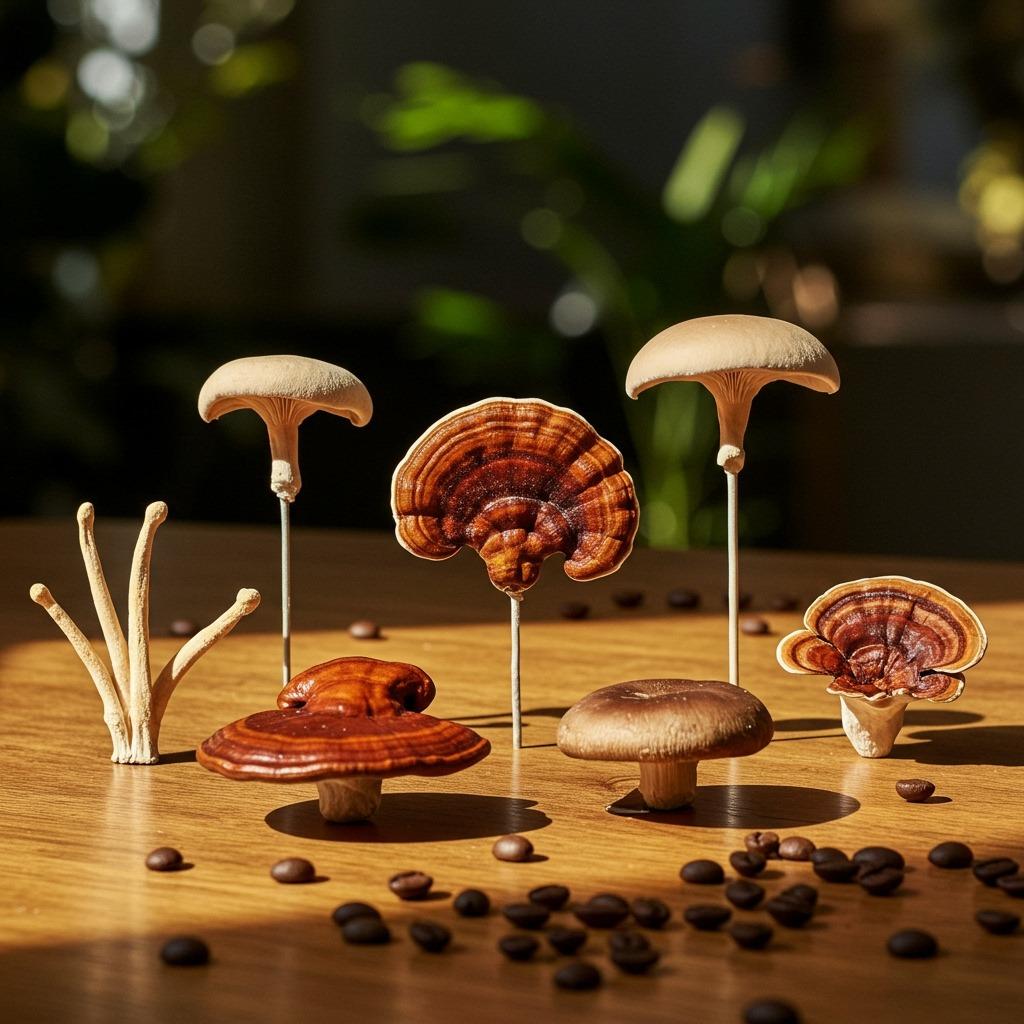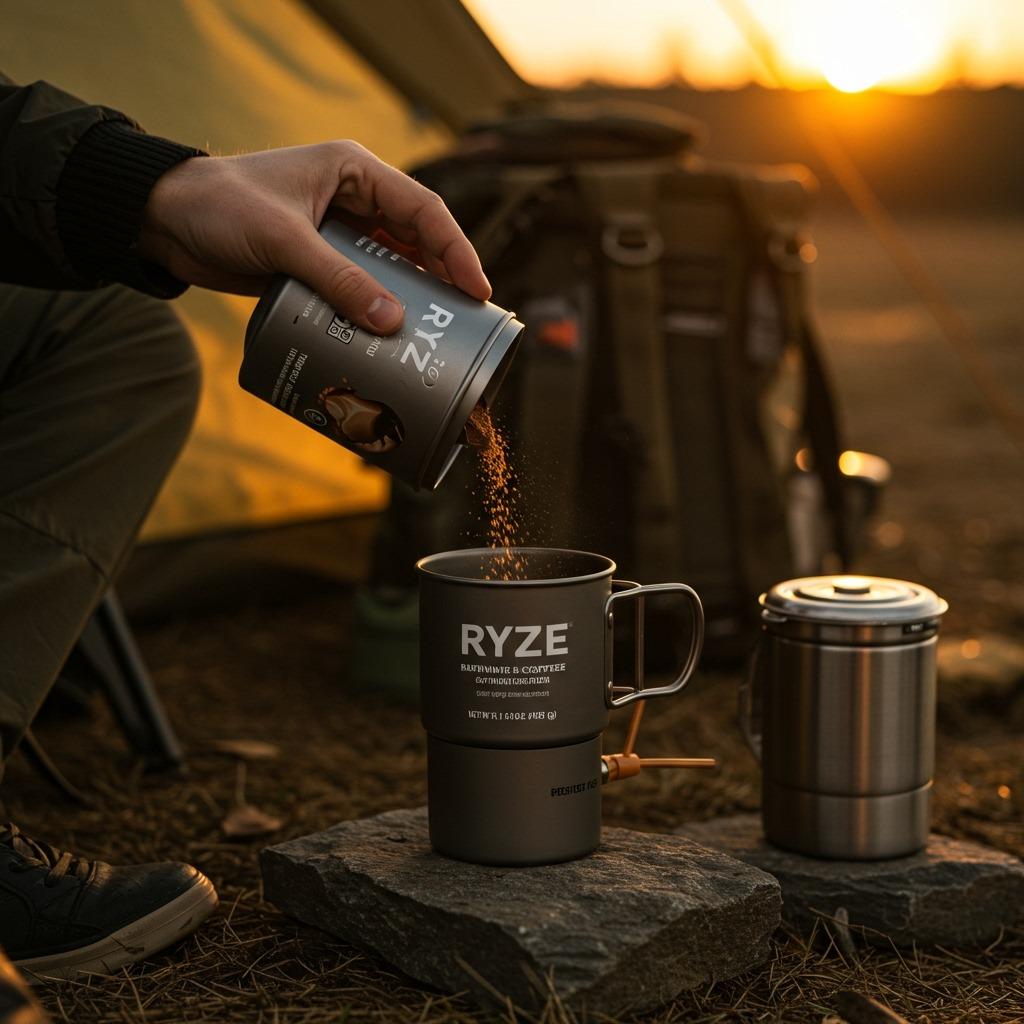Last month, after a particularly challenging hike in the Colorado Rockies, I found myself searching for a gentler way to fuel my morning adventures. My usual double-shot espresso routine was leaving me jittery on the trail, making me wonder if there was a middle ground between high-octane coffee and going completely caffeine-free. That’s when I discovered Ryze mushroom coffee and dove deep into understanding its caffeine content.
Yes, Ryze coffee does contain caffeine, but significantly less than regular coffee. A cup of Ryze mushroom coffee medium roast contains approximately 48mg of caffeine per serving, which is less than half the amount found in a regular cup of coffee that typically contains 95-100mg of caffeine. This makes it an excellent option for outdoor enthusiasts who want sustained energy without the crashes that can derail a good hiking day.
Much like planning the perfect camping breakfast ideas requires balancing nutrition with energy needs, choosing the right coffee involves understanding how different caffeine levels affect your outdoor performance. Ryze achieves this lower caffeine content through their unique blend that combines organic Arabica coffee with six adaptogenic mushrooms, MCT oil, and coconut milk.
Understanding Ryze Coffee’s Unique Caffeine Profile
The Science Behind Reduced Caffeine
Ryze’s approach to caffeine is intentionally different from traditional coffee brands. While most coffee companies focus on maximizing caffeine content, Ryze deliberately reduces it to create what they call “calm energy.” This isn’t achieved by removing caffeine after the fact, but rather by carefully balancing the ratio of coffee to other ingredients.
The organic Arabica coffee base provides the familiar coffee flavor and caffeine boost, but the addition of adaptogenic mushrooms, MCT oil, and coconut milk powder creates a different energy experience altogether. This combination approach means you’re getting sustained energy from multiple sources rather than relying solely on caffeine stimulation.
Two Distinct Roast Options
Ryze offers two different roast profiles with varying caffeine levels to accommodate different preferences:
Medium Roast (Original): Contains about 48mg of caffeine per serving. This flagship product appeals to people seeking gentle energy without overstimulation. It’s perfect for those who love the ritual of coffee but want to avoid the jitters that can interfere with outdoor activities.
Dark Roast: Contains 80-90mg of caffeine per serving. This option provides a bolder coffee experience that’s more comparable to traditional coffee while maintaining all the mushroom benefits. It’s ideal for serious coffee lovers who aren’t ready to give up that stronger caffeine kick.
The medium roast remains Ryze’s most popular option, particularly among people transitioning from high-caffeine coffee or those who’ve discovered that less caffeine actually improves their daily energy stability.
Comparative Caffeine Analysis
To put Ryze’s caffeine content in proper perspective, here’s how it stacks up against other popular beverages:
- Regular brewed coffee: 95-100mg per 8oz cup
- Ryze medium roast: 48mg per serving
- Ryze dark roast: 80-90mg per serving
- Espresso shot: 63mg per shot
- Black tea: 40-50mg per 8oz cup
- Green tea: 25-35mg per 8oz cup
- Energy drinks: 80-300mg per serving
- Decaf coffee: 2-5mg per 8oz cup
Ryze’s medium roast falls perfectly between tea and regular coffee, making it an ideal choice for those looking to reduce caffeine while maintaining some stimulant benefits. This moderate caffeine level is particularly appealing to outdoor enthusiasts who need steady energy for activities like hiking but don’t want the crash that can hit mid-trail.
The Mushroom Advantage: Energy Beyond Caffeine
Understanding Adaptogenic Energy
While Ryze does contain caffeine from its organic Arabica coffee base, the company emphasizes that the mushrooms do most of the “heavy lifting” when it comes to sustained energy production. This represents a fundamentally different approach to energy than traditional coffee’s caffeine-centric model.
Adaptogenic mushrooms work with your body’s natural systems to support energy production and stress management. Unlike caffeine, which provides immediate stimulation followed by a crash, adaptogens help regulate your body’s response to stress and fatigue, creating more stable energy levels throughout the day.
Cordyceps stands out as the primary energy-supporting mushroom in the blend. This fungus has been used for centuries in traditional Chinese medicine to enhance stamina and reduce fatigue. Research suggests Cordyceps may improve oxygen utilization and support cellular energy production, providing natural energy enhancement without relying heavily on stimulants.
Lion’s Mane contributes to the energy equation by supporting cognitive function and mental clarity. When your brain functions more efficiently, you often need less caffeine to achieve focus and alertness. This mushroom is particularly valued by outdoor enthusiasts who need sharp decision-making skills on challenging terrain.
Reishi, known as the “queen of mushrooms,” helps balance the body’s stress response. By supporting your natural ability to handle stress, Reishi can contribute to more stable energy levels and better recovery from physical exertion – crucial for active lifestyles.
This synergistic approach allows Ryze to provide comprehensive energy support while using roughly half the caffeine of regular coffee. The result is sustained energy that many users describe as more stable and longer-lasting than traditional coffee’s quick spike and crash pattern.
The MCT Oil and Coconut Milk Factor
Beyond mushrooms, Ryze includes MCT (Medium Chain Triglycerides) oil and organic coconut milk powder, both of which contribute to the energy equation. MCT oil provides readily available fuel for both brain and body, often described as “clean burning” energy that doesn’t cause the jitters associated with high caffeine intake.
The coconut milk adds healthy fats that slow the absorption of caffeine, creating a more gradual energy release. This combination helps explain why many Ryze users report sustained energy lasting 4-6 hours without the typical mid-morning crash.
Just as understanding how to stay warm while camping requires knowledge of layering systems, optimizing your energy for outdoor activities benefits from understanding how different ingredients work together to support sustained performance.
Who Should Consider Ryze Coffee
Ideal Candidates for Lower-Caffeine Coffee
Ryze’s reduced caffeine content makes it particularly suitable for several groups of people who struggle with traditional coffee’s high caffeine levels:
Caffeine-sensitive individuals often experience jitters, anxiety, rapid heartbeat, or digestive issues with regular coffee. The lower caffeine content in Ryze, combined with the balancing effects of adaptogenic mushrooms, frequently allows these people to enjoy coffee-like beverages without negative side effects.
Afternoon coffee drinkers face the challenge of wanting coffee later in the day without disrupting sleep. Ryze’s 48mg of caffeine is low enough that many people can enjoy it in the afternoon without significant sleep impact, though individual sensitivity varies.
People reducing caffeine intake can use Ryze as a stepping stone in their journey to decrease caffeine consumption. Rather than going cold turkey and dealing with withdrawal symptoms, Ryze provides a gentler transition while maintaining coffee rituals and some energy benefits.
Outdoor enthusiasts with digestive sensitivity may find Ryze’s mushroom blend and lower caffeine content easier on their stomach than regular coffee. The reduced acidity and added beneficial compounds can be particularly helpful for those who experience stomach upset from traditional coffee during or after physical activities.
Busy professionals seeking stable energy often discover that Ryze’s sustained energy profile helps them avoid the productivity crashes associated with high-caffeine coffee. The combination of moderate caffeine with adaptogenic support creates steady energy that supports consistent performance throughout the day.
When to Exercise Caution
Despite its lower caffeine content and natural ingredients, Ryze still contains enough caffeine to potentially cause issues for certain individuals:
Pregnant or breastfeeding women should consult with healthcare providers before adding any new caffeine sources to their diet, including Ryze. While the caffeine content is lower than regular coffee, medical guidance is always recommended during pregnancy and breastfeeding.
People with severe caffeine sensitivity or certain medical conditions may still react to Ryze’s caffeine content. Those who can’t tolerate any caffeine should look for completely caffeine-free alternatives.
Individuals taking medications that interact with caffeine should discuss Ryze with their healthcare providers, as even moderate caffeine amounts can affect medication absorption or effectiveness.
Children and adolescents should not consume Ryze due to both its caffeine content and the adaptogenic mushroom blend, which is formulated for adult metabolism and needs.
Preparation, Taste, and Integration into Daily Routines
Simple Preparation Methods
One of Ryze’s advantages is its convenience factor. The instant powder format makes it incredibly easy to prepare, whether you’re at home, in the office, or out camping. Here’s how to get the best results:
Basic preparation: Mix 1 tablespoon of Ryze powder with 8-10 ounces of hot water (around 175-185°F for optimal flavor extraction). Stir thoroughly using the wooden spoon included with your purchase. The powder dissolves completely when mixed properly.
Enhanced versions: Add your favorite creamer, plant-based milk, or sweetener to customize flavor. Many users enjoy adding a dash of cinnamon or vanilla extract to complement the earthy mushroom notes.
Cold preparation: Ryze works well as an iced beverage. Mix with room temperature water first to ensure complete dissolution, then add ice. Some users prefer to blend it with cold milk alternatives for a smoother texture.
Creative applications: The powder can be incorporated into smoothies, baked goods, or even used as a flavor enhancer in camping meals, similar to how you might use other ingredients from your hiking snacks collection.
Understanding the Flavor Profile
Ryze has a distinct taste that differs significantly from regular coffee, and understanding what to expect helps with the adjustment period:
Initial impressions: The flavor combines familiar coffee notes with earthy undertones from the mushroom blend. Many describe it as smooth and less acidic than regular coffee, with hints of roasted hazelnut and natural sweetness from the coconut milk.
Mushroom presence: While some people worry about a strong mushroom taste, most users report that the earthy notes are subtle and complement rather than overpower the coffee flavor. The mushroom taste is more noticeable to those with sensitive palates, but it’s generally described as pleasant and grounding.
Texture differences: The addition of MCT oil and coconut milk powder creates a naturally creamy texture that many find more satisfying than black coffee. This richness can help ease the transition for those accustomed to adding cream or milk to their regular coffee.
Adjustment Timeline and Expectations
Most users experience a predictable adjustment period when transitioning to Ryze:
First few days: The taste may seem unfamiliar, and the caffeine reduction might be noticeable if you’re coming from high-caffeine coffee. Some people experience mild withdrawal symptoms like slight headaches or fatigue during this initial period.
First week: Gradual adaptation to both flavor and energy levels occurs. Many users begin to appreciate the sustained energy without crashes during this phase.
2-3 weeks: Full adaptation typically occurs around this timeframe. Most users report preferring the sustained energy experience and finding the flavor appealing. The body has usually adjusted to the lower caffeine intake, and the adaptogenic benefits become more noticeable.
Long-term use: After a month of consistent use, many people report improved energy stability, better sleep quality (when consumed earlier in the day), and reduced dependence on caffeine for basic functioning.
Health Benefits and Nutritional Considerations
Comprehensive Mushroom Benefits
The six mushrooms in Ryze each contribute unique properties that extend far beyond basic energy support:
Cordyceps has been extensively studied for its ability to improve oxygen utilization and support cellular energy production. For outdoor enthusiasts, this can translate to better endurance and reduced fatigue during physical activities. Research suggests Cordyceps may also support healthy blood sugar levels and immune function.
Lion’s Mane is renowned for its cognitive benefits, including support for memory, focus, and overall brain health. The mushroom contains compounds called hericenones and erinacines that may stimulate nerve growth factor production. For hikers and outdoor adventurers, improved cognitive function can enhance safety and decision-making in challenging environments.
Reishi is often called the “mushroom of immortality” in traditional medicine. Its adaptogenic properties help the body manage stress more effectively, potentially improving sleep quality and overall resilience. This is particularly valuable for people with active lifestyles who need effective recovery.
Shiitake provides immune system support through compounds like lentinan, which may help maintain healthy immune function. For outdoor enthusiasts exposed to varying weather conditions and physical stress, immune support is crucial.
Turkey Tail is rich in polysaccharides that support gut health and immune function. A healthy gut microbiome is increasingly recognized as fundamental to overall health, energy levels, and even mood regulation.
King Trumpet rounds out the blend with additional antioxidant properties and potential cardiovascular benefits, supporting overall health and vitality.
Additional Functional Ingredients
MCT Oil derived from coconuts provides several benefits beyond energy. These medium-chain triglycerides are rapidly absorbed and can cross the blood-brain barrier, providing quick fuel for brain function. MCT oil may also support healthy weight management and provide sustained energy without blood sugar spikes.
Organic Coconut Milk adds healthy fats, natural sweetness, and a creamy texture while contributing to the sustained energy profile. The combination of healthy fats with moderate caffeine helps slow caffeine absorption, reducing the likelihood of jitters while extending energy duration.
Organic Arabica Coffee provides not just caffeine but also antioxidants like chlorogenic acids, which may support cardiovascular health and provide cellular protection. The organic sourcing ensures the coffee is grown without synthetic pesticides or fertilizers.
Comparing Nutritional Profiles
A typical serving of Ryze contains approximately:
- Calories: 15-20 (very low calorie impact)
- Carbohydrates: 2-3g (primarily from coconut milk)
- Fat: 1-2g (from MCT oil and coconut milk)
- Protein: Less than 1g
- Caffeine: 48mg (medium roast) or 80-90mg (dark roast)
- Adaptogenic mushroom blend: 2,000mg total
This nutritional profile makes Ryze suitable for most dietary approaches, including keto, paleo, and intermittent fasting protocols. The low calorie and carbohydrate content means it won’t significantly impact fasting states while still providing energy and cognitive benefits.
Cost Analysis and Value Proposition
Understanding the Investment
Ryze typically costs around $30-45 per bag containing 30 servings, making it more expensive per serving than regular coffee but competitive with other specialty coffee alternatives and health supplements. When evaluating cost, consider several factors:
Per-serving cost: At approximately $1-1.50 per serving, Ryze costs more than home-brewed regular coffee (around $0.25-0.50 per cup) but less than most coffee shop beverages ($3-6 per drink).
Functional benefits: The price includes not just coffee but also a therapeutic dose of six different mushrooms, MCT oil, and organic coconut milk. When compared to purchasing these ingredients separately as supplements, Ryze offers reasonable value.
Convenience factor: The instant format saves time and equipment needs compared to traditional brewing methods. For busy people or travelers, this convenience has inherent value.
Potential healthcare cost savings: Some users report improved energy, better sleep, and enhanced immune function, which could translate to indirect healthcare savings, though individual results vary.
Comparing to Alternatives
When evaluating Ryze against other options:
Regular coffee plus separate supplements: Purchasing quality coffee, mushroom supplements, MCT oil, and other ingredients separately would likely cost more than Ryze while requiring more preparation time.
Other mushroom coffee brands: Ryze’s pricing is competitive within the mushroom coffee category, with some brands costing more and others slightly less, but ingredient quality and mushroom variety vary significantly.
Coffee shop visits: For people who regularly purchase coffee shop drinks, replacing even half of those visits with Ryze could result in net savings while providing superior nutritional benefits.
Energy drinks and pre-workouts: Many users find Ryze replaces their need for other energy products, potentially offsetting the cost through reduced spending on supplements and energy drinks.
Similar to how investing in quality camping clothes pays off through better performance and durability on outdoor adventures, choosing a functional coffee alternative like Ryze can provide value through improved daily energy and health benefits.
Real-World Applications and User Experiences
Outdoor and Athletic Performance
Many outdoor enthusiasts have integrated Ryze into their adventure routines with positive results. The sustained energy profile makes it particularly suitable for activities requiring steady performance over extended periods.
Pre-hike consumption: The moderate caffeine content provides alertness without the jitters that can affect balance and decision-making on challenging terrain. The adaptogenic mushrooms may help with stress management during demanding climbs or long-distance hikes.
Recovery support: The anti-inflammatory properties of several mushrooms in the blend, combined with the stress-management benefits, can support post-activity recovery. Many users report feeling less fatigued after physical exertion when they’ve consumed Ryze earlier in the day.
High-altitude considerations: Some users report that Ryze’s gentler energy profile works better at altitude than high-caffeine coffee, though this varies by individual and specific elevation factors.
Professional and Academic Applications
The cognitive benefits of Lion’s Mane combined with moderate caffeine make Ryze appealing to professionals and students seeking sustained mental performance:
Extended work sessions: The 4-6 hour energy duration without crashes makes Ryze suitable for long work periods or study sessions. The absence of energy crashes can improve productivity and maintain consistent performance.
Stress management: The adaptogenic properties may help users manage work-related stress more effectively, potentially improving both performance and well-being in demanding professional environments.
Afternoon use: The lower caffeine content allows some people to consume Ryze in the afternoon without disrupting sleep, extending productive hours without compromising rest.
Integration with Health and Wellness Routines
Ryze fits well into various health and wellness approaches:
Intermittent fasting: The minimal calorie content makes it suitable for most fasting protocols while providing energy and cognitive support during fasting periods.
Meditation and mindfulness practices: Many users report that Ryze provides alertness without the agitation that high-caffeine coffee can create, making it compatible with meditation and mindfulness practices.
Stress reduction protocols: The adaptogenic mushrooms support the body’s natural stress response, complementing other stress management techniques like exercise, meditation, or yoga.
For those interested in expanding their coffee knowledge and outdoor experiences, learning about cowboy coffee techniques can provide additional brewing options for wilderness adventures.
Frequently Asked Questions
Is Ryze coffee safe for daily consumption?
Yes, Ryze is generally safe for daily consumption for healthy adults. The organic ingredients, moderate caffeine content, and adaptogenic mushrooms make it gentler than regular coffee. The recommended usage is 1-2 servings daily. However, as with any supplement or significant dietary change, consult with a healthcare provider if you have underlying health conditions, take medications, or experience any adverse reactions.
Will I experience caffeine withdrawal switching from regular coffee?
Some people may experience mild adjustment symptoms when switching from high-caffeine coffee to Ryze due to the significant reduction in caffeine (from ~100mg to 48mg). This is typically temporary and may include slight headaches, fatigue, or irritability for 2-5 days. To minimize withdrawal, consider gradually reducing regular coffee intake while introducing Ryze, or alternate between the two during the transition period.
Can I drink Ryze if I’m trying to eliminate caffeine completely?
Ryze is not caffeine-free, containing 48mg in the medium roast, so it wouldn’t be suitable for complete caffeine elimination. However, it could serve as an excellent stepping stone for those gradually reducing caffeine intake before moving to completely caffeine-free alternatives. The lower caffeine content makes it easier to eventually transition away from caffeine entirely.
How does Ryze compare to decaf coffee in terms of caffeine?
Decaf coffee typically contains 2-5mg of caffeine, making it much lower than Ryze’s 48mg. However, Ryze offers the additional benefits of adaptogenic mushrooms, MCT oil, and sustained energy that decaf coffee doesn’t provide. If you need some caffeine but want less than regular coffee, Ryze is ideal. If you need to avoid caffeine almost entirely, decaf would be more appropriate.
Does the mushroom taste overpower the coffee flavor?
Most users report that while there are subtle earthy undertones from the mushrooms, the coffee flavor remains recognizable and pleasant. The mushroom taste is generally described as grounding rather than overpowering. The taste is smooth and less acidic than regular coffee, with the mushroom flavors complementing rather than dominating the overall profile. Individual taste sensitivity varies, but most people adapt to and enjoy the flavor within a week.
Can children or teenagers consume Ryze coffee?
Ryze is not recommended for children or teenagers due to both its caffeine content and the adaptogenic mushroom blend, which is formulated for adult metabolism and needs. The product is specifically designed for adult consumption, and young people should avoid functional beverages containing caffeine and adaptogenic compounds without medical supervision.
How long do the effects of Ryze last compared to regular coffee?
Many users report sustained energy for 4-6 hours without the typical coffee crash, compared to regular coffee’s 2-3 hour peak followed by a crash. The combination of moderate caffeine, adaptogenic mushrooms, and MCT oil creates a more gradual energy curve. Individual experiences vary based on factors like body weight, caffeine sensitivity, metabolism, and tolerance levels.
Is Ryze suitable for people with mushroom allergies?
People with mushroom allergies should avoid Ryze coffee due to its six-mushroom blend (Cordyceps, Lion’s Mane, Reishi, Shiitake, Turkey Tail, and King Trumpet). Always consult with healthcare providers regarding food allergies before trying new products. If you have specific mushroom allergies, review the complete ingredient list and discuss with an allergist before consumption.
Can I use Ryze as a pre-workout drink?
Many people successfully use Ryze as a pre-workout drink, particularly for endurance activities or moderate-intensity workouts. The moderate caffeine content provides energy without excessive stimulation, while Cordyceps may support exercise performance. However, for high-intensity training, some athletes prefer higher caffeine amounts. The 4-6 hour energy duration makes it suitable for longer workout sessions or outdoor activities.
How should I store Ryze coffee to maintain freshness?
Store Ryze in a cool, dry place away from direct sunlight and moisture. Keep the container tightly sealed after each use to prevent moisture absorption and maintain powder quality. Properly stored, Ryze maintains its potency and flavor for the duration indicated on the package. Avoid storing in humid environments like near the stove or in refrigerators where condensation could occur.
Conclusion: Finding Your Perfect Energy Balance
Ryze coffee represents a thoughtful approach to daily energy management, offering 48mg of caffeine in the medium roast alongside a comprehensive blend of adaptogenic mushrooms and functional ingredients. For outdoor enthusiasts, busy professionals, and anyone seeking sustained energy without the crashes associated with high-caffeine coffee, Ryze provides a compelling alternative to traditional coffee routines.
The combination of moderate caffeine with adaptogenic support creates an energy experience that many users describe as more stable and sustainable than regular coffee. Whether you’re planning your next hiking adventure or simply want to optimize your daily energy levels, understanding Ryze’s caffeine content and functional benefits helps you make an informed decision about whether it fits your lifestyle and goals.
As with any significant change to your coffee routine, the transition to Ryze may require some adjustment, but many users find the sustained energy and reduced jitters worth the initial adaptation period. The key is understanding your individual caffeine needs and sensitivity levels, just like understanding your gear needs when planning primitive camping adventures.
Ready to explore more about optimizing your energy and outdoor experiences? Check out these helpful resources:
- Learn about coffee science and health at Harvard School of Public Health
- Discover mushroom research and benefits through National Institutes of Health
- Explore adaptogenic herbs and mushrooms at Mount Sinai Health System
Whether Ryze becomes your new morning ritual or serves as an occasional alternative to regular coffee, understanding its caffeine content and functional benefits empowers you to make choices that support your energy goals and overall wellness. The journey to optimal energy is personal, and having options like Ryze expands the possibilities for creating a coffee routine that truly serves your lifestyle and adventures.




